Posted: May 1, 2024 | Author: bostonboomer | Filed under: abortion rights, democracy is threatened, Donald Trump, Joe Biden, Surreality | Tags: "presidential immunity", concentration camps, deportations, immigration, mob violence, state monitoring of pregnanacies, Supreme Court, Time interview with Trump |
Good Morning!!

Rene Magritte, The False Mirror, 1928
Yesterday, Time Magazine published an interview with Donald Trump. Why did he choose Time to reveal his plans for rescinding the Constitution if he is elected in November? I’d guess it’s because he wanted another Time cover to add to his collection. He’s a demented old man who doesn’t realize that Time long ago became fairly irrelevant. But they certainly got the attention of the the political world yesterday. Trump spelled out his plans for 2025 and beyond and they are horrifying.
I agree with this tweet that Aaron Rupar posted after reading the article:
I increasingly believe this election will be a referendum on whether anything matters anymore. There’s no rational case for Trump, but there’s a loud contingent on the left that just wants to burn it down. Combine that with low information voters and Republicans circling the wagons around their guy, and you have the outlines of a calamity. Hopefully people wake up.
Here’s the Time interview, followed by commentary from other publications. I’ve cut out the author’s cutesy commentary and just included Trump’s plans.
Eric Cortellessa at Time: How Far Trump Would Go.
Six months from the 2024 presidential election, Trump is better positioned to win the White House than at any point in either of his previous campaigns. He leads Joe Biden by slim margins in most polls, including in several of the seven swing states likely to determine the outcome. But I had not come to ask about the election, the disgrace that followed the last one, or how he has become the first former—and perhaps future—American President to face a criminal trial. I wanted to know what Trump would do if he wins a second term, to hear his vision for the nation, in his own words.
What emerged in two interviews with Trump, and conversations with more than a dozen of his closest advisers and confidants, were the outlines of an imperial presidency that would reshape America and its role in the world. To carry out a deportation operation designed to remove more than 11 million people from the country, Trump told me, he would be willing to build migrant detention camps and deploy the U.S. military, both at the border and inland. He would let red states monitor women’s pregnancies and prosecute those who violate abortion bans. He would, at his personal discretion, withhold funds appropriated by Congress, according to top advisers. He would be willing to fire a U.S. Attorney who doesn’t carry out his order to prosecute someone, breaking with a tradition of independent law enforcement that dates from America’s founding. He is weighing pardons for every one of his supporters accused of attacking the U.S. Capitol on Jan. 6, 2021, more than 800 of whom have pleaded guilty or been convicted by a jury. He might not come to the aid of an attacked ally in Europe or Asia if he felt that country wasn’t paying enough for its own defense. He would gut the U.S. civil service, deploy the National Guard to American cities as he sees fit, close the White House pandemic-preparedness office, and staff his Administration with acolytes who back his false assertion that the 2020 election was stolen.
Trump remains the same guy, with the same goals and grievances. But in person, if anything, he appears more assertive and confident. “When I first got to Washington, I knew very few people,” he says. “I had to rely on people.” Now he is in charge. The arranged marriage with the timorous Republican Party stalwarts is over; the old guard is vanquished, and the people who remain are his people. Trump would enter a second term backed by a slew of policy shops staffed by loyalists who have drawn up detailed plans in service of his agenda, which would concentrate the powers of the state in the hands of a man whose appetite for power appears all but insatiable. “I don’t think it’s a big mystery what his agenda would be,” says his close adviser Kellyanne Conway. “But I think people will be surprised at the alacrity with which he will take action.” [….]
In a second term, Trump’s influence on American democracy would extend far beyond pardoning powers. Allies are laying the groundwork to restructure the presidency in line with a doctrine called the unitary executive theory, which holds that many of the constraints imposed on the White House by legislators and the courts should be swept away in favor of a more powerful Commander in Chief.

TV Man, by Michael Vincent Manalo
Nowhere would that power be more momentous than at the Department of Justice. Since the nation’s earliest days, Presidents have generally kept a respectful distance from Senate-confirmed law-enforcement officials to avoid exploiting for personal ends their enormous ability to curtail Americans’ freedoms. But Trump, burned in his first term by multiple investigations directed by his own appointees, is ever more vocal about imposing his will directly on the department and its far-flung investigators and prosecutors.
In our Mar-a-Lago interview, Trump says he might fire U.S. Attorneys who refuse his orders to prosecute someone: “It would depend on the situation.” He’s told supporters he would seek retribution against his enemies in a second term. Would that include Fani Willis, the Atlanta-area district attorney who charged him with election interference, or Alvin Bragg, the Manhattan DA in the Stormy Daniels case, who Trump has previously said should be prosecuted? Trump demurs but offers no promises. “No, I don’t want to do that,” he says, before adding, “We’re gonna look at a lot of things. What they’ve done is a terrible thing.”
Trump has also vowed to appoint a “real special prosecutor” to go after Biden. “I wouldn’t want to hurt Biden,” he tells me. “I have too much respect for the office.” Seconds later, though, he suggests Biden’s fate may be tied to an upcoming Supreme Court ruling on whether Presidents can face criminal prosecution for acts committed in office. “If they said that a President doesn’t get immunity,” says Trump, “then Biden, I am sure, will be prosecuted for all of his crimes.” (Biden has not been charged with any, and a House Republican effort to impeach him has failed to unearth evidence of any crimes or misdemeanors, high or low.)
On his goal of mass deportation of immigrants:
Trump’s radical designs for presidential power would be felt throughout the country. A main focus is the southern border. Trump says he plans to sign orders to reinstall many of the same policies from his first term, such as the Remain in Mexico program, which requires that non-Mexican asylum seekers be sent south of the border until their court dates, and Title 42, which allows border officials to expel migrants without letting them apply for asylum. Advisers say he plans to cite record border crossings and fentanyl- and child-trafficking as justification for reimposing the emergency measures. He would direct federal funding to resume construction of the border wall, likely by allocating money from the military budget without congressional approval. The capstone of this program, advisers say, would be a massive deportation operation that would target millions of people. Trump made similar pledges in his first term, but says he plans to be more aggressive in a second. “People need to be deported,” says Tom Homan, a top Trump adviser and former acting head of Immigration and Customs Enforcement. “No one should be off the table.”
For an operation of that scale, Trump says he would rely mostly on the National Guard to round up and remove undocumented migrants throughout the country. “If they weren’t able to, then I’d use [other parts of] the military,” he says. When I ask if that means he would override the Posse Comitatus Act—an 1878 law that prohibits the use of military force on civilians—Trump seems unmoved by the weight of the statute. “Well, these aren’t civilians,” he says. “These are people that aren’t legally in our country.” He would also seek help from local police and says he would deny funding for jurisdictions that decline to adopt his policies. “There’s a possibility that some won’t want to participate,” Trump says, “and they won’t partake in the riches.”
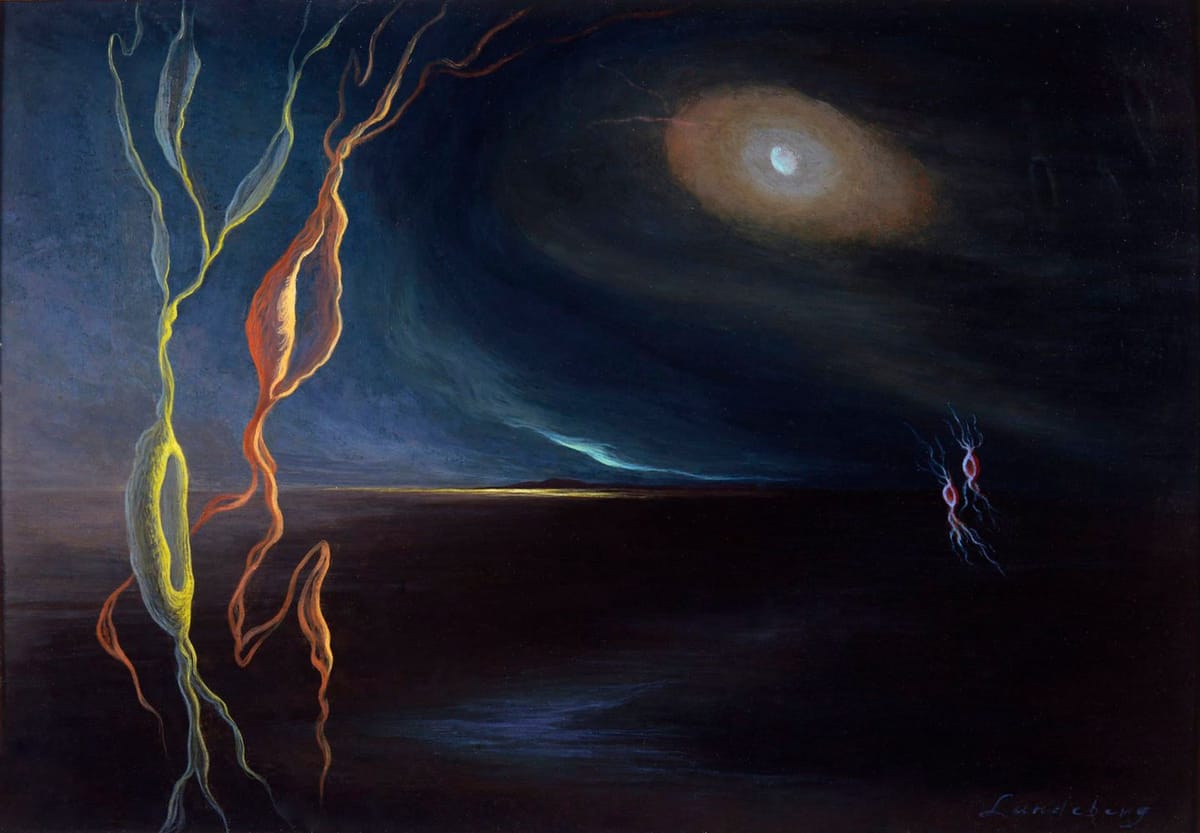
Helen Lundeberg, Biological Fantasy, 1946
On Abortion:
As President, Trump nominated three Supreme Court Justices who voted to overturn Roe v. Wade, and he claims credit for his role in ending a constitutional right to an abortion. At the same time, he has sought to defuse a potent campaign issue for the Democrats by saying he wouldn’t sign a federal ban. In our interview at Mar-a-Lago, he declines to commit to vetoing any additional federal restrictions if they came to his desk. More than 20 states now have full or partial abortion bans, and Trump says those policies should be left to the states to do what they want, including monitoring women’s pregnancies. “I think they might do that,” he says. When I ask whether he would be comfortable with states prosecuting women for having abortions beyond the point the laws permit, he says, “It’s irrelevant whether I’m comfortable or not. It’s totally irrelevant, because the states are going to make those decisions.” President Biden has said he would fight state anti-abortion measures in court and with regulation.
Trump’s allies don’t plan to be passive on abortion if he returns to power. The Heritage Foundation has called for enforcement of a 19th century statute that would outlaw the mailing of abortion pills. The Republican Study Committee (RSC), which includes more than 80% of the House GOP conference, included in its 2025 budget proposal the Life at Conception Act, which says the right to life extends to “the moment of fertilization.” I ask Trump if he would veto that bill if it came to his desk. “I don’t have to do anything about vetoes,” Trump says, “because we now have it back in the states.”
There’s much more at the Time Magazine link.
Two brief commentaries from TNR:
Elie Quinland Houghtaling at The New Republic: Trump Hints Another January 6 Could Happen If He Loses the Election.
Donald Trump hasn’t quite let go of the possibility of utilizing mob violence if he loses the next election.
In a sprawling interview for Time magazine, Trump hinted that leveraging political violence to achieve his end goals was still on the table.
“If we don’t win, you know, it depends,” he told Time. “It always depends on the fairness of the election.”
And from Trump’s perspective, that’s winning rhetoric. According to him, his incendiary comments supporting a mob mentality, his early warnings of forthcoming abuses of power, and his threats to be a dictator on “day one” are only inching him closer to the White House. “I think a lot of people like it,” Trump told Time….
Meanwhile, the trial that will determine Trump’s level of involvement on the day that his followers actually attempted to overthrow Congress’s certification of the 2020 vote has been indefinitely waylaid by the former president’s claim of presidential immunity. The Supreme Court heard arguments for that case last week. It is currently unclear how the justices will decide the case, though they are expected to issue an opinion sometime between the end of June and early July.
Also from TNR, by Hafiz Rashid: If This Trump Warning on 2024 Doesn’t Scare You, You’re Sleepwalking. Donald Trump is warning that 2024 could be America’s “last election.”
If you ask Donald Trump, the election could determine the fate of the United States itself.
“If we don’t win on November 5, I think our country is going to cease to exist. It could be the last election we ever have. I actually mean that,” the former president said at a campaign rally in Grand Rapids, Michigan, on Tuesday.

JeeYoung Lee, Panic Room, 2010
In fact, looking at Trump’s plans for a potential second term, it’s more likely that the opposite is true. He has claimed that he wants to be a dictator, but only on “day one,” and plans to install his legal allies at all levels of government. And his Cabinet? It’s sure to be full of ideologues, immigration hard-liners, and outright fascists. Even conservative judges claim he’ll shred the legal system.
But Trump’s remarks could also be a veiled threat that he should win, or else. The far right, from Trump down to militias, hate groups, and grassroots MAGA supporters, could react violently if the election doesn’t go in their favor.
As Brynn Tannehill wrote for The New Republic in March, “The election cycle either ends in chaos and violence, balkanization, or a descent into a modern theocratic fascist dystopia.” It might not be a stretch to suggest that Trump could plan another January 6–type event if he loses. After all, only months prior to the Capitol insurrection, he urged the Proud Boys to “stand back and stand by” on a debate stage.
Molly Olmstead at Slate: The Most Alarming Answer From Trump’s Interview With Time.
On April 12, former President Donald Trump sat for an interview with Time. That interview, which ran with some follow-up questions from this past Saturday, was published on Tuesday, and it included a number of alarming tidbits from Trump, many of which reaffirmed his earlier extreme positions or took them further.
But perhaps the most shocking response dealt with a hypothetical posed by the reporter, Eric Cortellessa. Relatively early in the conversation, Cortellessa pushed Trump to take a stance on a federal abortion ban. Trump refused, insisting that his views on abortion did not matter—that he was leaving it up to the states to decide, and that was that. Even as Cortellessa insisted that it was “important to voters” to know where he stands, Trump didn’t budge, even when asked how he felt about women being punished for having abortions. Cortellessa then raised the prospect of a surveillance state keeping tabs on women and their reproductive systems:
Cortellessa: Do you think states should monitor women’s pregnancies so they can know if they’ve gotten an abortion after the ban?
Trump: I think they might do that. Again, you’ll have to speak to the individual states. Look, Roe v. Wade was all about bringing it back to the states.
Trump’s refusal to take a stance on such a sinister possibility shows he remains just as concerned about disappointing his white evangelical base as he is about alienating more moderate voters. But he may have underestimated just how radical this nonstance really was, and just how unsettling it may seem to voters.
That ended up being a theme of the more than hourlong interview: Trump dodged so many questions by railing about his victimhood, boasting about his victories, or just straight-out lying, but when he did give a direct response, it showed a man who had learned no lessons from his 2020 loss or his ongoing legal challenges. The Trump of the interview was just as extreme as ever.
Read the rest at Slate.
Ed Pilkington at The Guardian: Trump threatens to prosecute Bidens if he’s re-elected unless he gets immunity.
Donald Trump has warned that Joe Biden and his family could face multiple criminal prosecutions once he leaves office unless the US supreme court awards Trump immunity in his own legal battles with the criminal justice system.
In a sweeping interview with Time magazine, Trump painted a startling picture of his second term, from how he would wield the justice department to hinting he may let states monitor pregnant women to enforce abortion laws….

Portrait of the Late Mrs. Partridge, by Leonora Carrington
Trump made a direct connection between his threat to appoint a special prosecutor to investigate the Bidens should he win re-election in November with the case currently before the supreme court over his own presidential immunity.
Asked whether he intends to “go after” the Bidens should he gain a second term in the White House, Trump replied: “It depends what happens with the supreme court.”
If the nine justices on the top court – three of whom were appointed by Trump – fail to award him immunity from prosecution, Trump said, “then Biden I am sure will be prosecuted for all of his crimes, because he’s committed many crimes”.
Trump and his Republican backers have long attempted to link Biden to criminal wrongdoing relating to the business affairs of his son Hunter Biden, without unearthing any substantial evidence. Last June, in remarks made at his golf course in Bedminster, New Jersey, Trump threatened to appoint a special prosecutor were he re-elected “to go after the most corrupt president in the history of the United States of America, Joe Biden, and the entire Biden crime family”. [….]
Several of Trump’s comments in the Time interview will ring alarm bells among those concerned with the former president’s increasingly totalitarian bent.
Trump’s remarks raise the specter that, were he granted a second presidential term, he would weaponize the justice department to seek revenge against the Democratic rival who defeated him in 2020.
Despite the violence that erupted on 6 January 2021 at the US Capitol after he refused to accept defeat in the 2020 election, which is the subject of one of two federal prosecutions he is fighting, Trump also declined to promise a peaceful transfer of power should he lose again in November.
Asked by Cortellessa whether there would be political violence should Trump fail to win, he replied: “If we don’t win, you know, it depends. It always depends on the fairness of an election.”
Pouring yet more gasoline on to the fire, Trump not only repeated his falsehood that the 2020 election had been stolen from him, but said he would be unlikely to appoint anyone to a second Trump administration who believed Biden had legitimately prevailed four years ago. “I wouldn’t feel good about it, because I think anybody that doesn’t see that that election was stolen – you look at the proof,” he said.
Philip Bump at The Washington Post: Trump won’t say what he plans to do as president.
The cover story of Time magazine is presented as definitive.
“If he wins,” it states over a picture of former president Donald Trump sitting on a stool. The story from reporter Eric Cortellessa bears the headline, “How far Trump would go,” and interweaves quotes from a lengthy interview Trump granted Cortellessa with the reporter’s assessments of what it tells us about a potential second Trump term.

Max Ernst, The Barbarians
But as is often the case, a lot of what Trump is reported as planning to do is constructed from murky, noncommittal answers Trump offered to specific questions. The interview is very revealing about Trump’s approach to the position in that it strongly suggests he hasn’t thought much about important issues, and makes clear how relentlessly he relies on rhetoric to derail questions.
The interview is not revealing about what Trump is firmly committed to doing. But that’s revealing in its own way: It makes it obvious that a second term, like the first, would see policy and executive actions driven by whomever is around Trump. And Trump is clearly committed to having around him only people who share his political worldview.
Before we list the firm policy commitments Trump offered to Cortellessa, which won’t take long, it’s useful to point out all the revealing comments Trump made simply by being given the space to talk.
For example, when asked whether he would use the military to help deport immigrants despite prohibitions against deploying the military against civilians, Trump told Cortellessa that “these aren’t civilians.” He claimed they were, instead, part of an “invasion,” rhetoric he’s used before. This is false — but revealing about Trump’s potential willingness to use force as part of a deportation effort.
I don’t know about this. I thought Trump made his plans pretty clear–especially because we can base our interpretations on what he has already done. But you can read more at the WaPo link.
Nicholas Nehamas and Reid J. Epstein at The New York Times: Biden and Democrats Seize on Trump’s Striking Interview.
The Biden campaign is mounting a concerted push to attack former President Donald J. Trump over statements he made to Time magazine in a wide-ranging interview published Tuesday morning, particularly on abortion.
In the interview, Mr. Trump refused to commit to vetoing a national abortion ban and said he would allow states to monitor women’s pregnancies and prosecute those who violated abortion restrictions.
“This is reprehensible,” President Biden wrote on X. “Donald Trump doesn’t trust women. I do.”
Julie Chavez Rodriguez, Mr. Biden’s campaign manager, said in a statement that Mr. Trump would “sign a national abortion ban, allow women who have an abortion to be prosecuted and punished, allow the government to invade women’s privacy to monitor their pregnancies and put I.V.F. and contraception in jeopardy nationwide.”
Abortion has become a winning issue for Democrats, and Mr. Biden has argued that Mr. Trump and Republicans will continue to erode abortion rights. He and Vice President Kamala Harris have campaigned heavily on the issue in battleground states, and Democrats hope that state ballot initiatives to protect abortion rights will help their candidates for president, Congress and state offices. Their messaging has sought to pin state abortion bans directly on Mr. Trump, whose appointees to the Supreme Court helped overturn Roe v. Wade….
The former president also told Time that he would deploy the U.S. military to detain and deport migrants, and did not dismiss the possibility of political violence should he lose the election.
Democrats highlighted some of those statements as well.
“Donald Trump’s repeated threats of political violence are as horrifying and dangerous as they are un-American,” said Alex Floyd, a spokesman for the Democratic National Committee. “Trump is hellbent on threatening our democracy, win or lose.”
Hillary Clinton urged her followers on X to read about Mr. Trump’s plans for a second term and “take them seriously.”
That’s all I have today. I truly believe that our democracy is hanging in the balance. Whatever you think of Joe Biden, he has generally been a good president. Trump was a disaster last time, and if he wins again, it will be be far worse–beyond anything we can imagine.
Did you like this post? Please share it with your friends:
Posted: April 24, 2024 | Author: bostonboomer | Filed under: "presidential immunity", 2024 presidential Campaign, abortion rights, Corrupt and Political SCOTUS, Donald Trump, Joe Biden, SCOTUS | Tags: Alvin Bragg, David Pecker, gag order, House Speaker Mike Johnson, Judge Juan Merchan, Manhattan hush money trial, National Enquirer, Ted Cruz, Ukraine aid |

By Gabriele Münter
Good Morning!!
Yesterday was the second day of Trump’s Manhattan trial for a plot to interfere with the 2016 election by covering up payoffs to extramarital sexual partners and planting fake stories in the National Enquirer.
It was also the second day of testimony by David Pecker, former CEO of American Media, which owned the Enquirer and many other publications. Pecker, Trump, and his lawyer/fixer Michael Cohen orchestrated the fake news operation.
Before the trial resumed, Judge Juan Merchan held a hearing about whether Trump had already violated the terms of his gag order.
A wrap-up of yesterday’s court business at The Washington Post: A secret pact at Trump Tower helped kill bad stories in 2016.
Donald Trump’s 2016 presidential campaign was repeatedly aided by the National Enquirer, which squelched potentially damaging stories about him and pumped out articles pummeling his rivals, the former boss of the supermarket tabloid testified Tuesday during the ex-president’s trial on charges of falsifying business records.
Trump, the first former U.S. president to face a criminal trial, spent his day in the Manhattan courtroom fighting two pitched battles — one against the testimony of former tabloid executive David Pecker, his longtime friend, and another against the increasingly likely prospect that he will be punished by the trial judge for allegedly violating a gag order.
On both fronts, prosecutors seemed to inflict significant damage. At one point, New York Supreme Court Justice Juan Merchan warned Trump lawyer Todd Blanche that he was “losing all credibility.” At another, Trump grimaced and shook his head as Pecker described how he helped kill an allegation — ultimately found to be false — that Trump had a child with a maid at his building.
The busy court day was punctuated by prosecutors detailing the full factual and legal foundation of their case against Trump, one built around a misdemeanor state charge of trying to illegally influence an election.
Pecker, the former CEO of American Media Inc., the company that once ran the Enquirer and other celebrity gossip publications, said he met with Trump and Trump’s then-lawyer Michael Cohen in 2015 to discuss how the tabloid, which had a long relationship with the real estate mogul and reality TV star, could help Trump’s bid for president.
“I said what I would do is I would run or publish positive stories about Mr. Trump, and I would publish negative stories about his opponents,” Pecker testified.
That wasn’t all he pledged to do.
Pecker said he told Trump: “I would be your eyes and ears. … If I hear anything negative about yourself, or if I hear anything about women selling stories, I would notify Michael Cohen as I did over the last several years.”
The deal Pecker described was a mutual back-scratching arrangement in which Cohen would feed stories to the tabloid about Republican rivals like Ted Cruz, and the paper would publish glowing stories about Trump. Pecker said he had a “great relationship” with Trump dating to the late 1980s, but that didn’t seem to be his primary motivation. Stories about the brash celebrity businessman helped sell copies of the tabloid.
NBC News on one of the most dramatic fake stories: National Enquirer made up the story about Ted Cruz’s father and Lee Harvey Oswald, former publisher says.
David Pecker, the former publisher of the National Enquirer, testified at Donald Trump’s trial Tuesday that the tabloid completely manufactured a negative story in 2016 about the father of Sen. Ted Cruz, of Texas, who was then Trump’s rival for the GOP presidential nomination.

By Anna Billing
The paper had published a photo allegedly showing Cruz’s father, Rafael Cruz, with Lee Harvey Oswald handing out pro-Fidel Castro pamphlets in New Orleans in 1963, not long before Oswald assassinated President John F. Kennedy.
Trump repeatedly referred to the story on the campaign trail and in interviews.
“I mean, what was he doing — what was he doing with Lee Harvey Oswald shortly before the death? Before the shooting?” Trump said in an interview with Fox News in May 2016. “It’s horrible.”
Manhattan prosecutor Joshua Steinglass asked Pecker about the story’s origins during the trial Tuesday in Manhattan. Pecker said that then-National Enquirer editor-in-chief Dylan Howard and the tabloid’s research department got involved, and Pecker indicated that they faked the photo that was the foundation for the story.
“We mashed the photos and the different picture with Lee Harvey Oswald. And mashed the two together. And that’s how that story was prepared — created I would say,” Pecker said on the witness stand.
Asked by Steinglass whether Cruz had gained popularity in the presidential race at the time, Pecker said, “I believe so.”
The revelation came up as the prosecution focused on negative articles that were published by the tabloid about Trump’s Republican opponents at the time. Pecker explained that it was Michael Cohen, Trump’s personal lawyer, who would orchestrate the planting of these stories.
Pecker said Cohen would call and say they’d like his publication to run an article on a certain candidate, adding that Cohen would then send him a piece about Cruz, for example, and the National Enquirer “would embellish it from there.”
The Enquirer also ran negative stories about other Trump opponents in the 2016 Republican primaries and about Hillary Clinton.
Judge Merchan hasn’t yet made a decision on whether Trump violated his gag order, but his decision could be released today.
Rolling Stone on the gag order hearing: ‘Losing All Credibility’: Judge Torches Team Trump’s Gag Order Defense.
Donald Trump’s alleged violations of a gag order restricting him from attacking witnesses, jurors, prosecutors, and court staff during his ongoing criminal hush money trial got their own day in court on Tuesday.
During a tense hearing, Judge Juan Merchan heard arguments from Manhattan prosecutors requesting that Trump be sanctioned for “willful” violations of the gag order — and sparred with Trump’s attorneys over claims of ignorance by the president. No decision was handed down Tuesday, but prosecutors have requested that Trump be fined $1,000 for each violation, and reminded that future violations of the order “can be punished not only with additional fines but also with a term of incarceration of up to 30 days.” [….]
Trump’s attorneys argued that, as a political candidate, the former president needed the freedom to respond to attacks by his critics. Merchan grilled this defense, pressing Trump’s team to back up their argument that witnesses in the case had directly attacked Trump. “I keep asking you over and over again for a specific answer, and I’m not getting an answer,” Merchan said to Trump attorney Todd Blanche.
Merchan also threw out the defense’s argument that Trump’s reposts on Truth Social did not constitute violations of the gag order, as the former president had several people helping run his account. “Your client can wash your hands of it,” Merchan said of reposts, telling Blanche that content doesn’t just “magically” appear on Trump’s account. “It’s not passive […] someone had to do something.”
Blanche at one point insisted to Merchan that Trump was aware of the gag order and trying to comply with it. Merchan wasn’t having it. “You’re losing all credibility,” Merchan responded. “I have to tell you right now, you’re losing all credibility with the court.”

Edvard Munch, Man in the Cabbage Field
It’s highly unlikely that the judge will decide to incarcerate Trump for gag order violations, but the Secret Service prepared, just in case.
ABC News: Secret Service prepares for if Trump is jailed for contempt in hush money case.
The U.S. Secret Service held meetings and started planning for what to do if former President Donald Trump were to be held in contempt in his criminal hush money trial and Judge Juan Merchan opted to send him to short-term confinement, officials familiar with the situation told ABC News.
Merchan on Tuesday reserved decision on the matter after a contentious hearing. Prosecutors said at this point they are seeking a fine.
“We are not yet seeking an incarceratory penalty,” assistant district attorney Chris Conroy said, “But the defendant seems to be angling for that.”
Officials do not necessarily believe Merchan would put Trump in a holding cell in the courthouse but they are planning for contingencies, the officials said.
There have not been discussions yet about what to do if Trump is convicted and sentenced to prison….
“Under federal law, the United States Secret Service must provide protection for current government leaders, former Presidents and First Ladies, visiting heads of state and other individuals designated by the President of the United States,” the agency said in a statement. “For all settings around the world, we study locations and develop comprehensive and layered protective models that incorporate state of the art technology, protective intelligence and advanced security tactics to safeguard our protectees. Beyond that, we do not comment on specific protective operations.”
I doubt if that will ever happen, much as I’d like it to. It’s much more likely Trump would be confined to his home with an ankle bracelet.
Yesterday, Trump claimed that thousands of his supporters who wanted to protest his trial outside the courthouse were turned away by police. That just didn’t happen, and he’s frustrated about it.
Amanda Marcotte at Salon: Trump keeps begging for a “rally behind MAGA” — but his supporters aren’t showing up to court.
Donald Trump can’t decide how he wants his supporters to feel about the scene outside of the Manhattan courtroom where he’s being tried on 34 felony indictments for election interference and business fraud. He repeatedly argues that the city he travels through in a daily motorcade to his trial is a war zone. “Violent criminals that are murdering people, killing people” are free to “do whatever they want,” he’s falsely claimed, blasting District Attorney Alvin Bragg as “lazy on violent crime” because he’s supposedly too focused on prosecuting Trump.

By Gary Kim
It’s all a lie — crime is way down from the pandemic-related spikes — but it’s one Trump repeats ad nauseam. And it’s constantly reinforced by Fox News, which pushes out a series of misleading stories and images meant to scare their elderly suburbanite audiences into believing that going into the nation’s largest city results in instant murder. Nonetheless, Trump keeps pleading with his followers to run through what they’ve been told is a “bloodbath” in order to, you know, persuade Bragg and presiding Judge Juan Merchan to just give up on this whole trial nonsense.
On Monday, Trump begged his followers on Truth Social to “RALLY BEHIND MAGA” at courthouses, unsubtly suggesting that they model themselves after the mostly imaginary leftist rioters who “scream, shout, sit, block traffic, enter buildings, not get permits, and basically do whatever they want.” When the MAGA hats failed to show, Trump tried to inspire them with a post complaining that it’s “SO UNFAIR!!!” that he doesn’t get throngs of people like the kind seen at the antiwar protest a few miles north at Columbia University. Other than a few scattered people with pro-Trump signs, the mob he longed for never showed. So he took his pleas to the cameras outside the courthouse Tuesday morning:
WordPress won’t let me post the video, but you can see it at the Salon link.
What’s especially funny about all this is that Trump can’t quite admit that his people just aren’t showing up, and keeps on blaming the barricades and the cops. His lies got to the level of childish make-believe on Tuesday afternoon, as he falsely claimed on Truth Social that “Thousands of people were turned away from the Courthouse” while denying that he was “disappointed by the crowds.” Of course, by fantasizing about a massive caravan rallied to his defense, he proved he is not satisfied with reality.
As the New York Times reported, “A day after Trump issued a call for more supporters to gather outside the Manhattan Criminal Courthouse, the number reached its nadir. The number of identifiable Trump fans across the street in Collect Pond Park on Tuesday sank to the mid-single digits, after hovering at about a dozen for a week”
How can this childish man actually have a chance to be POTUS again?
One more article on the Manhattan trial–an opinion piece by Jed Handelsman Shugerman at The New York Times: I Thought the Bragg Case Against Trump Was a Legal Embarrassment. Now I Think It’s a Historic Mistake.
About a year ago, when Alvin Bragg, the Manhattan district attorney, indicted former President Donald Trump, I was critical of the case and called it an embarrassment. I thought an array of legal problems would and should lead to long delays in federal courts.
After listening to Monday’s opening statement by prosecutors, I still think the Manhattan D.A. has made a historic mistake. Their vague allegation about “a criminal scheme to corrupt the 2016 presidential election” has me more concerned than ever about their unprecedented use of state law and their persistent avoidance of specifying an election crime or a valid theory of fraud.
To recap: Mr. Trump is accused in the case of falsifying business records. Those are misdemeanor charges. To elevate it to a criminal case, Mr. Bragg and his team have pointed to potential violations of federal election law and state tax fraud. They also cite state election law, but state statutory definitions of “public office” seem to limit those statutes to state and local races.
Both the misdemeanor and felony charges require that the defendant made the false record with “intent to defraud.” A year ago, I wondered how entirely internal business records (the daily ledger, pay stubs and invoices) could be the basis of any fraud if they are not shared with anyone outside the business. I suggested that the real fraud was Mr. Trump’s filing an (allegedly) false report to the Federal Election Commission, and only federal prosecutors had jurisdiction over that filing.
A recent conversation with Jeffrey Cohen, a friend, Boston College law professor and former prosecutor, made me think that the case could turn out to be more legitimate than I had originally thought. The reason has to do with those allegedly falsified business records: Most of them were entered in early 2017, generally before Mr. Trump filed his Federal Election Commission report that summer. Mr. Trump may have foreseen an investigation into his campaign, leading to its financial records. Mr. Trump may have falsely recorded these internal records before the F.E.C. filing as consciously part of the same fraud: to create a consistent paper trail and to hide intent to violate federal election laws, or defraud the F.E.C.
In short: It’s not the crime; it’s the cover-up.
Looking at the case in this way might address concerns about state jurisdiction. In this scenario, Mr. Trump arguably intended to deceive state investigators, too. State investigators could find these inconsistencies and alert federal agencies. Prosecutors could argue that New York State agencies have an interest in detecting conspiracies to defraud federal entities; they might also have a plausible answer to significant questions about whether New York State has jurisdiction or whether this stretch of a state business filing law is pre-empted by federal law.
Shugerman didn’t address the fake news operation with the Enquirer.

Henry Woods, El velo de la primera comunión (1893)
In other news, the Senate passed the bill with aid to Ukraine, and Biden will sign it today.
The New York Times: Biden to Sign Aid Package for Ukraine and Israel.
President Biden was set to sign a $95.3 billion package of aid to Ukraine, Israel and Taiwan on Wednesday, reaffirming U.S. support for Kyiv in the fight against Russia’s military assault after months of congressional gridlock put the centerpiece of the White House’s foreign policy in jeopardy.
The Senate voted overwhelmingly to approve the package on Tuesday night, a sign of bipartisan support after increasingly divisive politics raised questions on Capitol Hill and among U.S. allies over whether the United States would continue to back Kyiv. The 79-to-18 vote provided Mr. Biden another legislative accomplishment to point to, even in the face of an obstructionist House.
“Congress has passed my legislation to strengthen our national security and send a message to the world about the power of American leadership: We stand resolutely for democracy and freedom, and against tyranny and oppression,” Mr. Biden said on Tuesday evening, just minutes after the Senate vote.
He said he would sign the bill into law and address the American people on Wednesday “so we can begin sending weapons and equipment to Ukraine this week.”
The White House first sent a request for the security package in October, and officials have bluntly acknowledged that the six-month delay put Ukraine at a disadvantage in its fight against Russia.
“The Russians have slowly but successfully taken more ground from the Ukrainians and pushed them back against their first, second and, in some places, their third line of defense,” John F. Kirby, a spokesman for Mr. Biden’s National Security Council, said on Tuesday on Air Force One. “The short answer is: Yes, there absolutely has been damage in the last several months.”
Arlette Saenz at CNN: How the White House convinced Mike Johnson to back Ukraine aid.
The Senate’s vote on Tuesday to approve new aid for Ukraine capped off six months of public pressure and private overtures by the White House to build support, including the not-insignificant task of winning over House Speaker Mike Johnson.
For months, President Joe Biden and his team pressed the case for additional aid both publicly and privately, leaning into courting Johnson – whose young speakership was under pressure from his right flank – behind the scenes through White House meetings, phone calls and detailed briefings on the battlefield impacts, administration officials said.
Grappling with the leadership dynamics in a House GOP conference increasingly resistant to more aid, Biden directed his team to use every opportunity possible to lay out the consequences of inaction directly to Johnson. That included warnings of what it would mean not just for Ukraine, but also Europe and the US, if Russian President Vladimir Putin were to succeed, administration officials said.
The president specifically urged his team to lean into providing a full intelligence picture of Ukraine’s battlefield situation in their conversations with the speaker and his staff as well as discussing the national security implications for the US, officials said. That push played out over the next six months – starting with a Situation Room briefing one day after Johnson became speaker.
National security adviser Jake Sullivan and Office of Management and Budget Director Shalanda Young briefed the speaker and other key lawmakers on how aid for Ukraine was running out, putting the country’s efforts to fight off Russia in jeopardy. Biden stopped by the meeting and met with Johnson on the side to convey a similar message. Sullivan followed up four days later with a call to Johnson to highlight the measures in place to track aid in Ukraine.
But Johnson quickly made clear aid for Ukraine and Israel would need to be separated – an approach the White House opposed and one that would be tested time and time again in the coming months.
The ordeal ended on Tuesday when the Senate passed the $95 billion foreign aid package, with nearly $61 billion for Ukraine, marking a long-sought foreign policy win for Biden, who has spent the past two years rallying Western support for the war-torn country in its fight against Russia. At the same time, the president has been grappling with his own battle back home to get more aid approved amid resistance from some Republicans. The White House has said he will sign that legislation – which also provides over $26 billion for Israel and humanitarian assistance and more than $8 billion for the Indo-Pacific, including Taiwan – as soon as possible.
Read more details at CNN.
While Trump has been dozing off in court in New York, President Biden has been campaigning, most recently in Florida.
HuffPost: Biden To Florida Voters: Six-Week Abortion Ban Is Trump’s Fault.
President Joe Biden swooped into Florida Tuesday, hoping to parlay the state’s new restrictive abortion law — as well as a ballot initiative that could undo it — into a campaign issue that could give him the state’s trove of electoral votes come November, effectively locking up his reelection.
“There’s one person responsible for this nightmare, and he acknowledges it and he brags about it: Donald Trump,” Biden told a boisterous crowd in a gym at Hillsborough Community College in Tampa.
He attacked Florida’s six-week abortion ban — approved in the wake of the Supreme Court’s 2022 decision overturning Roe v. Wade and ending a national right to abortion — and reminded voters that it was the coup-attempting former president’s three appointees to the high court that paved the way.
“It was Donald Trump who ripped away the rights and freedom of women in America,” he said. “We’ll teach Donald Trump and extreme MAGA Republicans a valuable lesson: Don’t mess with the women of America.”
Political consultants from both parties, while skeptical that Biden will actually win Florida, agree that forcing Trump on the defensive in a state he cannot afford to lose and which he only won by three percentage points in 2020 is a smart move.
“I don’t think he’d be in Tampa today if they didn’t see it as good place to make a contrast,” said Steve Schale, who ran former President Barack Obama’s successful Florida campaign operation in both 2008 and 2012. “There’s nothing more valuable, particularly for an incumbent, than a candidate’s time.”

David Hockney, NIchols Canyon, Hollywood HIlls
Just one more story–an op-ed by Melissa Murray and Andrew Weissmann in The New York Times on the Supreme Court’s upcoming hearing on Trump’s claim of “presidential immunity.”
The Supreme Court Has Already Botched the Trump Immunity Case.
The Supreme Court’s decision to hear oral arguments in Donald Trump’s immunity-appeal case on Thursday may appear to advance the rule of law. After all, few, if anyone, thinks that a majority of the court will conclude that a former president is completely immune from federal criminal liability.
But the court’s decision to review the immunity case actually undermines core democratic values.
The Supreme Court often has an institutional interest in cases of presidential power. But the court’s insistence on putting its own stamp on this case — despite the widespread assumption that it will not change the application of immunity to this case and the sluggish pace chosen to hear it — means that it will have needlessly delayed legal accountability for no justifiable reason. Even if the Supreme Court eventually does affirm that no person, not even a president, is above the law and immune from criminal liability, its actions will not amount to a victory for the rule of law and may be corrosive to the democratic values for which the United States should be known.
That is because the court’s delay may have stripped citizens of the criminal justice system’s most effective mechanism for determining disputed facts: a trial before a judge and a jury, where the law and the facts can be weighed and resolved.
It is this forum — and the resolution it provides — that Mr. Trump seeks, at all costs, to avoid. It is not surprising that he loudly proclaims his innocence in the court of public opinion. What is surprising is that the nation’s highest court has interjected itself in a way that facilitates his efforts to avoid a legal reckoning.
Looking at the experience of other countries is instructive. In Brazil, the former president Jair Bolsonaro, after baselessly claiming fraud before an election, was successfully prosecuted in a court and barred from running for office for years. In France, the former president Jacques Chirac was successfully prosecuted for illegal diversion of public funds during his time as mayor of Paris. Likewise, Argentina, Italy, Japan and South Korea have relied on the courts to hold corrupt leaders to account for their misconduct….
Consider India, Bolivia, Hungary and Venezuela, where the erosion of judicial independence of the courts has been accompanied by a rise in all-consuming power for an individual leader.
Within our constitutional system, the U.S. Supreme Court can still act effectively and quickly to preserve the judiciary’s role in a constitutional democracy. If the court is truly concerned about the rule of law and ensuring that these disputed facts are resolved in a trial, it could issue a ruling quickly after the oral argument.
It would then fall to the special counsel Jack Smith and Judge Chutkan to ensure that this case gets to a jury. Obviously, fidelity to due process and careful attention to the rights of the accused are critical. To get to a trial and avoid any further potential delay, Mr. Smith may decide to limit the government’s case to its bare essentials — what is often called the “slim to win” strategy. And Judge Chutkan has already warned Mr. Trump that his pretrial unruly statements with respect to witnesses and others may result in her moving up the start of the trial to protect the judicial process.
Read the rest at the NYT.
That’s it for me today. What do you think? Are there other stories that interest you?
Did you like this post? Please share it with your friends:



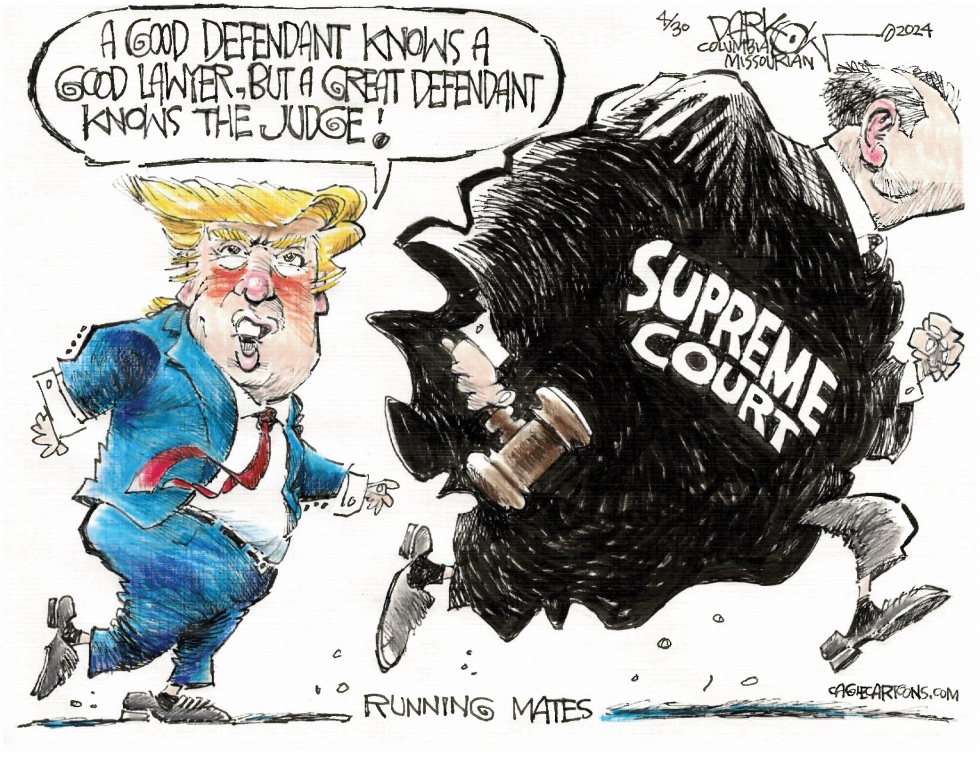
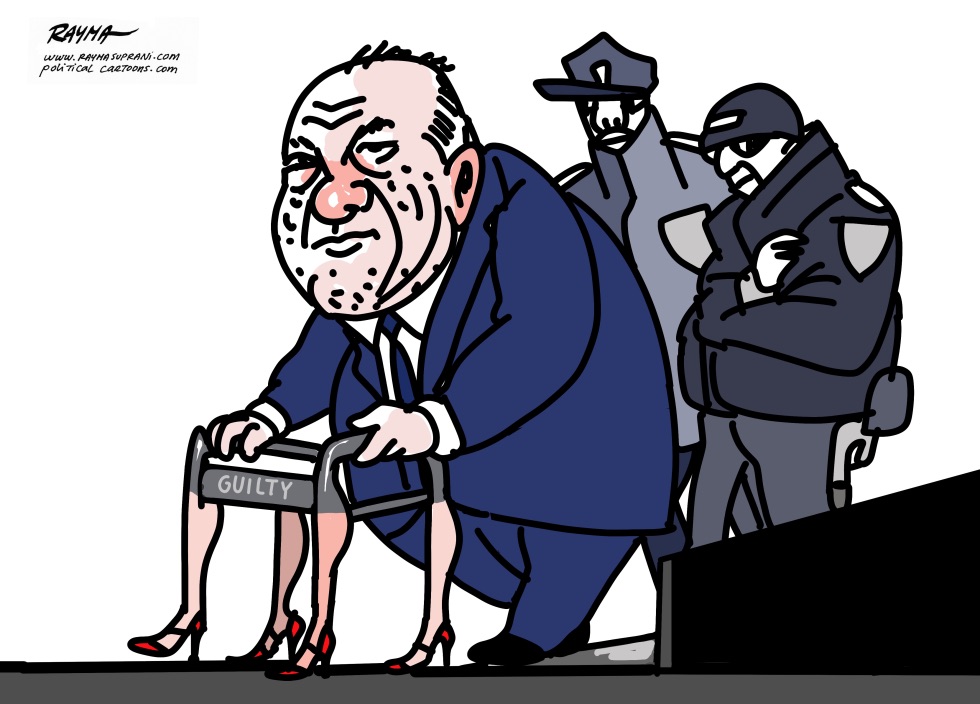














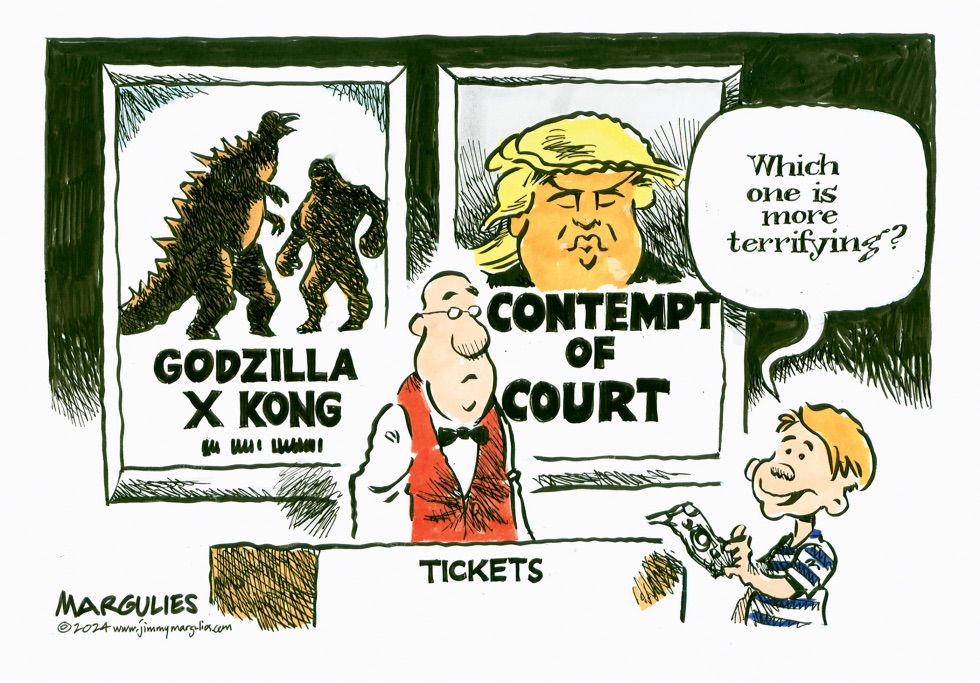
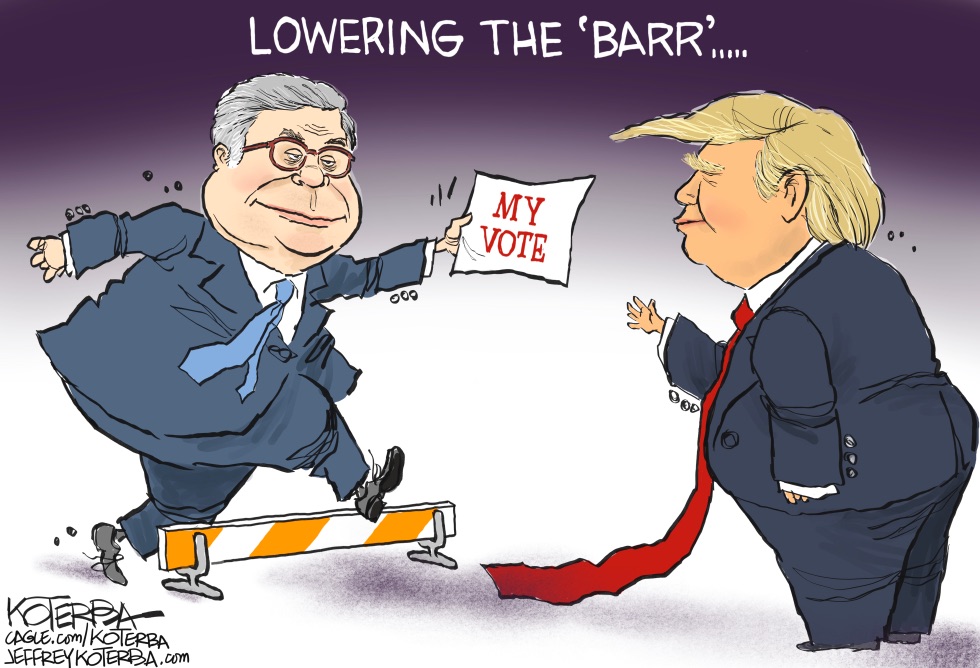



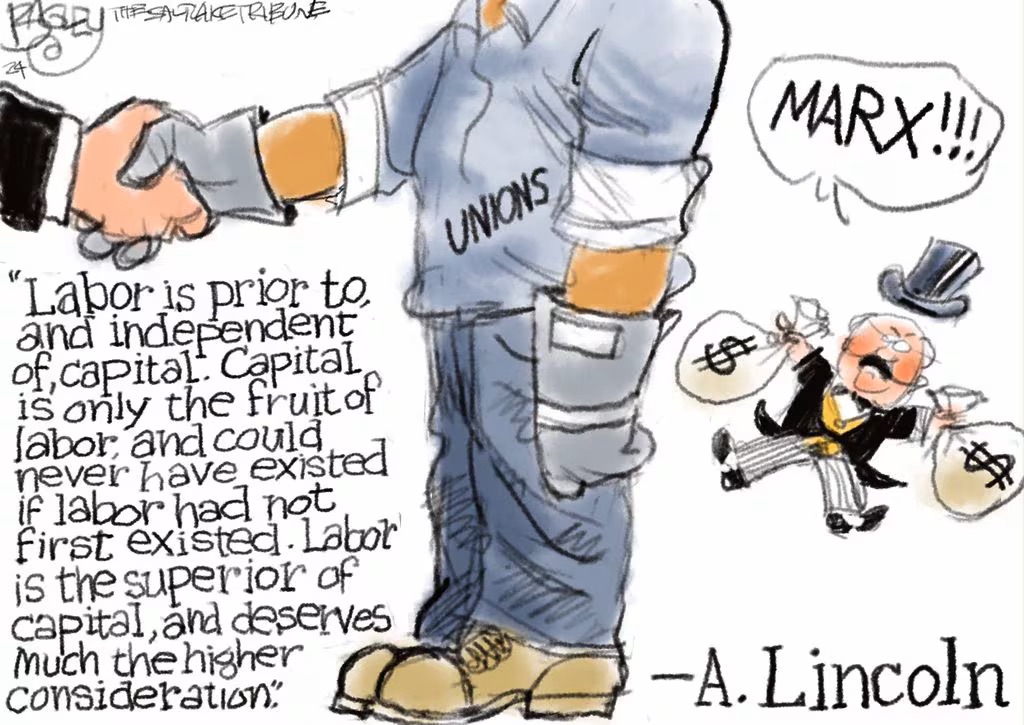
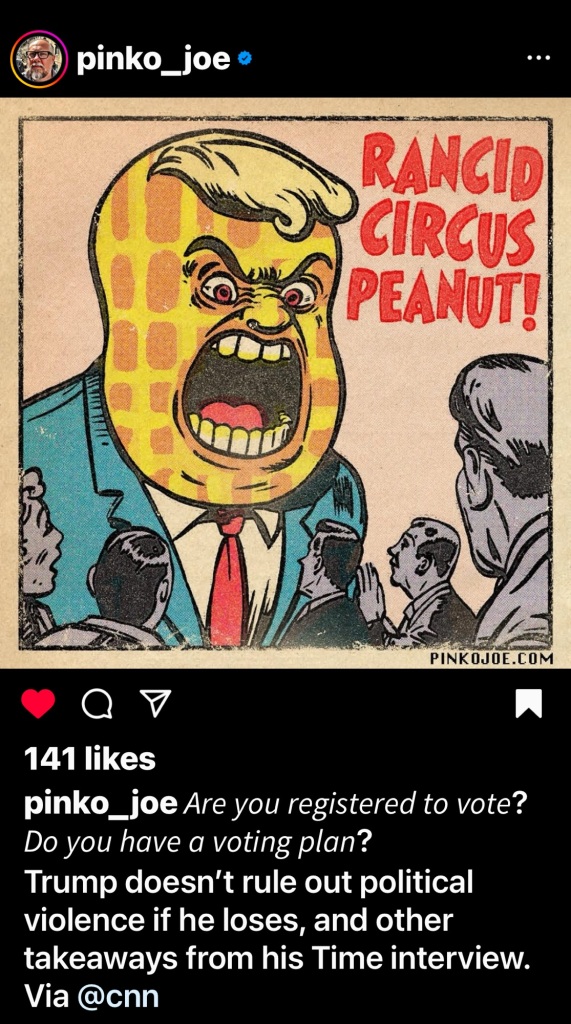


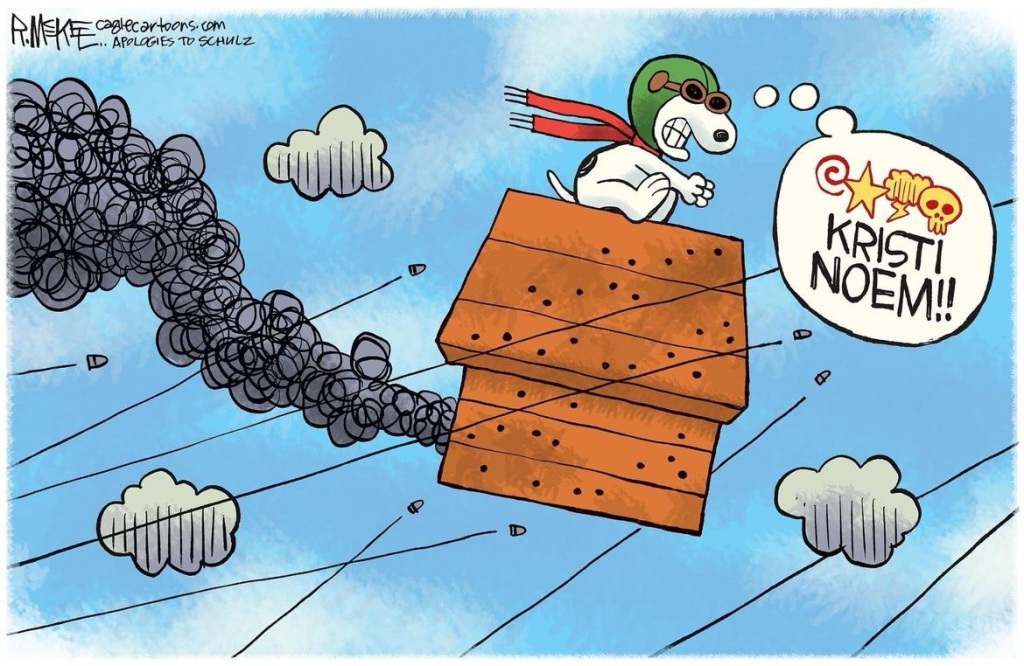





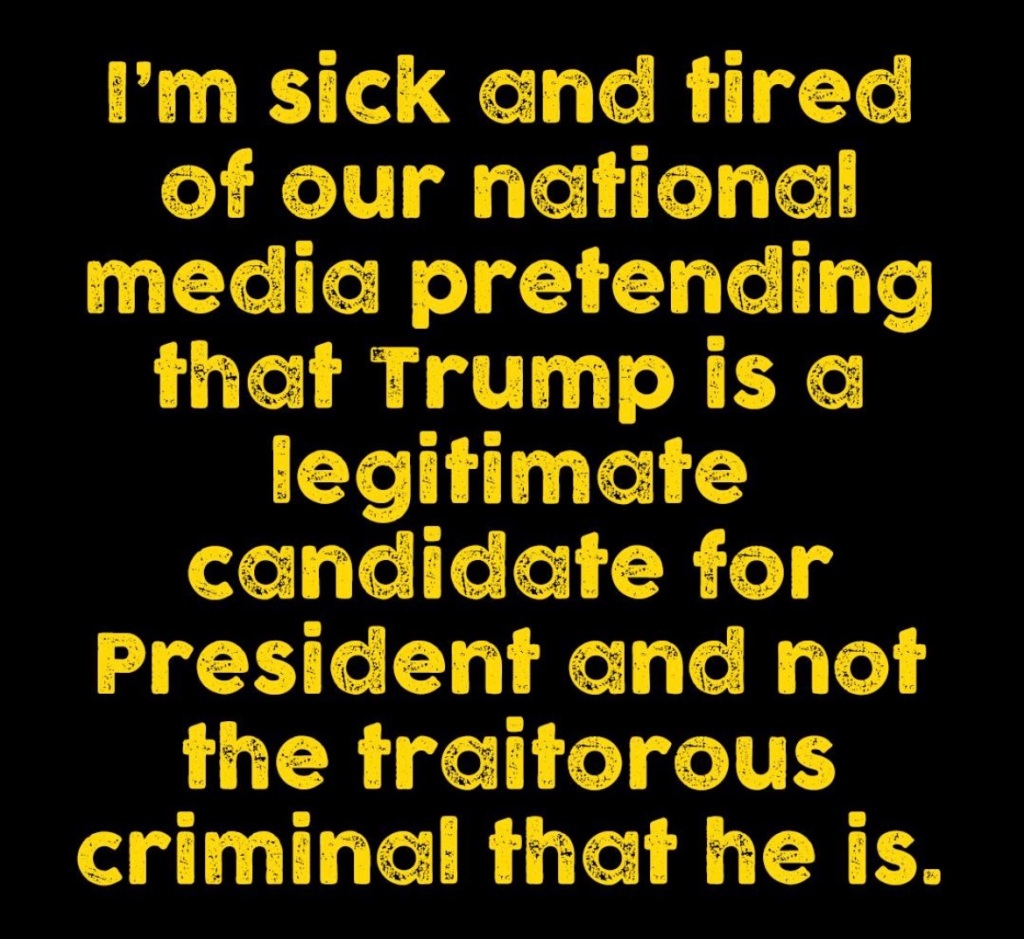




















































































Recent Comments